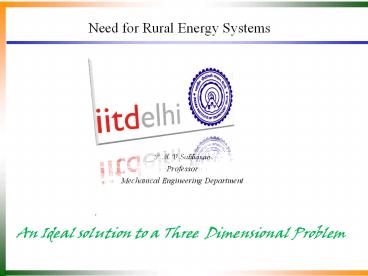Need for Rural Energy Systems - PowerPoint PPT Presentation
1 / 20
Title:
Need for Rural Energy Systems
Description:
Need for Development of Rural Energy Systems P M V Subbarao Professor Mechanical Engineering Department An Ideal solution to a Three Dimensional Problem – PowerPoint PPT presentation
Number of Views:117
Avg rating:3.0/5.0
Title: Need for Rural Energy Systems
1
Need for Rural Energy Systems
P M V Subbarao Professor Mechanical Engineering
Department
An Ideal solution to a Three Dimensional Problem
2
Why RES ?
- A Pico Power Plant lt 30 kW.
- Rural Energy Systems are Pico Plants.
- No Standard technologies.
- Highly customized Designs.
- Low Profit Margins.
3
Gram Swaraj A pivotal concept in Mahatama
Gandhi's thinking
- The fundamental concept of Gram swaraj is that
every village should be its own republic, - "independent of its neighbours for its own vital
wants and yet interdependent for many others in
which dependence is necessary," according to
Gandhi, writing in 1942. - Each village should be basically self-reliant,
making provision for all necessities of life -
food, clothing, clean water, sanitation, housing,
education and so on .
Pico Energy Systems are also the Requirement of
Gram Swaraj
4
Why Pico? A Scientific Three dimensional Problem
Statement.
5
The First Dimension Highly Distributed Resources
- The natural and renewable resources are
distributed - In quantity and quality.
- One single big plant is not holistically viable.
- Pico size is a true solution to this dimension.
6
(No Transcript)
7
(No Transcript)
8
Geo-thermal Map of India
9
Existing biomass capacity in India
10
Irrational Energy Service by Central Big Fossil
Units Among Humans
- Many remote villages without electricity/energy
appliances. - Unreliable supply to inner towns and villages.
- Dangerous social problems Non-cooperation of
remote population to peace of Nation !!?!?!?!
11
Countries with large population without access to
electricity
12
Number of Un-electrified Villages
Sl. No. State No. of un-electrified villages as on 31-3-2006 Villages Electrified during 2006-07 Balance un-electrified villages
1. Uttar Pradesh 31,063 16,620 14,443
2. Orissa 21,294 0 21,294
3. Jharkhand 20,431 0 20,431
4. Bihar 18,405 8,415 9,990
5. Rajasthan 13,908 765 13,143
6. Maharashtra 5,554 0 5,554
7. Assam 5,464 0 5,464
8. West Bengal 5,084 2,108 2,976
13
Number of Un-electrified Households
Sl. No. State No. of un-electrified households (in lakhs) of un-electrified Households
1. Bihar 120 94.57
2. Jharkhand 34 90.01
3. Assam 35 83.46
4. Orissa 54.7 80.65
5. Uttar Pradesh 165 80.16
6. West Bengal 88.9 79.73
7. Meghalaya 2.2 69.74
8. Tripura 3.68 68.25
9. Rajasthan 40.06 55.98
10. Mizoram 0.44 55.86
11. Arunachal Pradesh 0.91 55.47
12. Chattisgarh 18.1 53.89
Total 562.99
14
Countries with the largest population relying on
traditional use of biomass for cooking, 2010
15
Human W/O Energy?
16
Third Dimension Impact on Environment Ecology
17
Unacceptable Impact of Fossil Units On Nature
- Fossil energy systems demand big central units.
- Strong influence on Climate.
- 200 years fossil energy culture changed the few
million years old climate cycle.
18
Globally, the power sector is responsible for
more than two-fifths (41) of total
energy-related CO2 emissions. In 2007
19
Impact of Large Solar Units on Environment
- Manufacturing the photovoltaic cells to produces
that energy requires silicon and produce some
waste products. - Inappropriate handling of these materials may
lead to hazardous exposure to humans and the
environment. - Installing solar power plants may require large
piece of land, which may impact existing
ecosystems. - The clearing and use of large areas of land for
solar power facilities can adversely affect
native vegetation and wildlife in many ways,
including loss of habitat interference with
rainfall and drainage or direct contact causing
injury or death. - The impacts are exacerbated when the species
affected are classified as sensitive, rare, or
threatened and endangered.
20
Concept of Pico Hybrid Distributed Power Units
- A typical rural power plant should be an
amalgamation any two or more of the Six energy
technologies identified in this work - Enriched Biogas Engines
- Biodiesel Engines
- Engines for producer gas
- Engines using a combination of bio-fuels.
- Micro-Hydel Turbines
- Animal Driven Prime Movers































